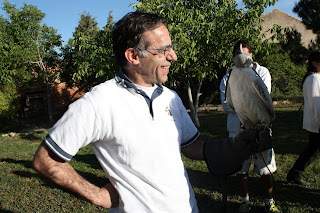Dear Veteran and Rookie Lions,
Time flies and in just a few weeks we will all be meeting at Barcelona Airport ready to start this yearly event. I am looking forward to meeting all of you there.
It is always nice to experience the reputation of the “Lions of the Pyrenees”, frequently beyond of what we deserve. I was travelling for work a few weeks ago in a European city and I met a client; to my surprise he knew one of our early Lions, who had informed him of our adventures; but the way he described what we do was a little exaggerated, so I had to correct one or two things. It is always nice to be recognised and admired, but I think it has to be always within reality. In any case whenever I travel or play sports many times I wear one of the Lions polos, you will not believe me if I tell you that on many occasions people ask me for one, I tell them that for them to be able to wear it, they have to earn it, they have to suffer, they have to deserve it; otherwise it takes away the joy of wearing it. And they all respect it.
As I informed you in one of my emails, a few weeks ago, on 14 March we had the death of our first Padre, Don Javier Mora-Figueroa, for those of us who knew, he was a real friend and always welcoming to the Lions; as being the Rector of Torreciudad, he was like the king of Torreciudad and could get anything done for us. Like the Mayor-President of El Grado, who also died a few years ago of liver cancer and was another “honorary Lion”; I feel that we should not be sad, but happy to have two local friends from our base camp in the Pyrenees in heaven. We can ask them to help us from up there.
I appreciate that as the Expedition comes closer, there are always difficulties and problems do arise. It is normal, we have to try to overcome them, as those of us who have come before will realize how much benefit we obtain from those days in the mountains. It is much more than the sport, the challenge; it is also the camaraderie and the mutual help of this group of friends who help each other to have a good time, helping in small and bigger things, and we all contribute to it.
In the same way that last year Jonny Dauncey (son of Tim Dauncey) came as one of the doctors of the Expedition; and he was the first son of a Lion to join the group; this year Ovidiu Radu (son of Vergiliu) will join us from Germany via Moldova. It is a great pleasure to see the group grow in this way. Even if we have come for so many years to this area, Fyrky and the other professional Mountain Guides ensure we do different things, we go to different valleys, mountains, ravines or canyons. The Pyrenees are not only wild and large, but they are always changing, and the weather conditions (snow, rain, sun, etc) make them look different.
Even if I have been in those Expeditions since the beginning, I always feel that the last one is the best; as the “spirit” of the Lions is seen in action, mutual support and help, interesting conversation, camaraderie which goes beyond duty, etc. It is a pleasure to see that others enjoy as much as I do. We all understand that one enjoys it more, when we try to make life agreeable to others in small things, and for this I am grateful to all veteran Lions. Just a word of warning, do train and keep training, but with moderation; as we have had some injuries. I myself twisted my ankle a few weeks ago whilst I was with clients in Barcelona and I have a bandage and a swollen foot. I spoke to a doctor and I am following his advice in every aspect; God willing I will recover soon.
As we go away, we remember our families and we train with them, as it is precisely due to our families support that we are able to do this; for this reason it is great to see that some Lions are being followed in this group of friends by their sons, as I told you before.
Ave Caesar Morituri Te Salutant!
A Lion of the Pyrenees
Antonio Irastorza







